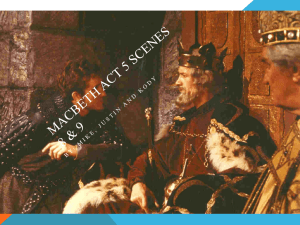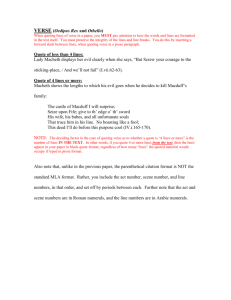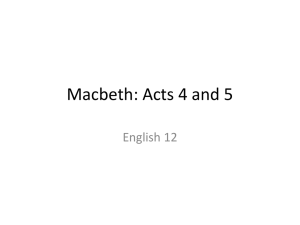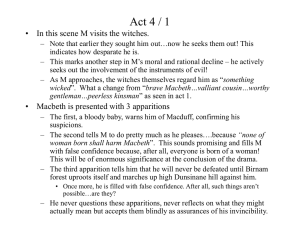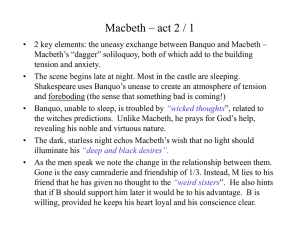Macduff True Hero - Achieve the Core
advertisement
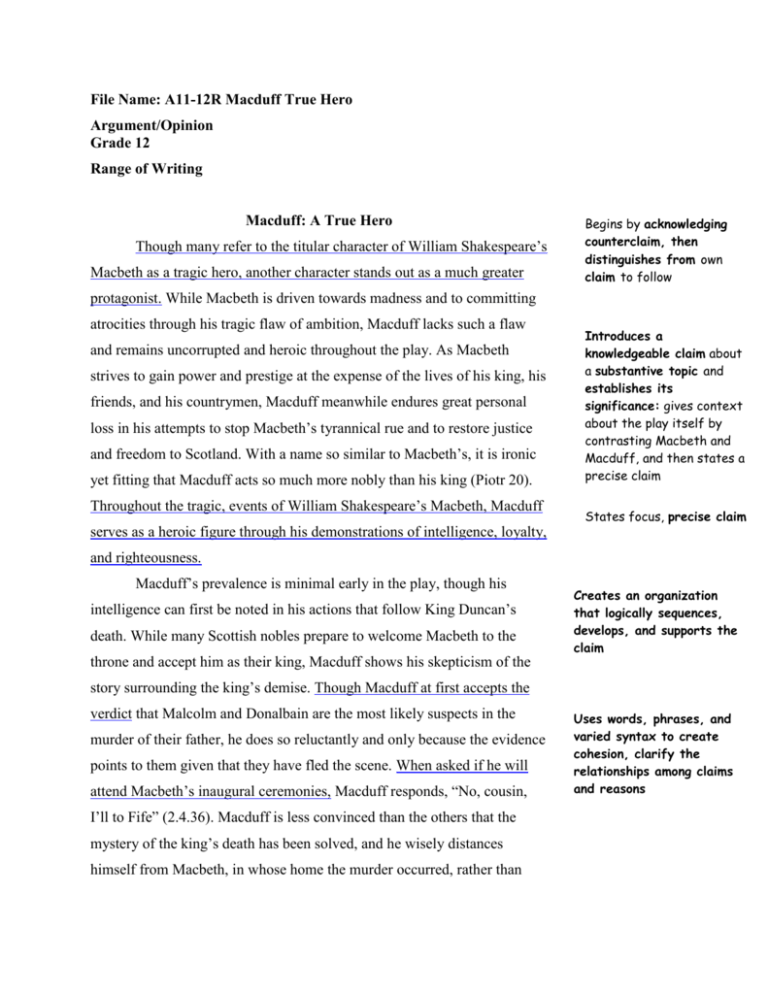
File Name: A11-12R Macduff True Hero Argument/Opinion Grade 12 Range of Writing Macduff: A True Hero Though many refer to the titular character of William Shakespeare’s Macbeth as a tragic hero, another character stands out as a much greater Begins by acknowledging counterclaim, then distinguishes from own claim to follow protagonist. While Macbeth is driven towards madness and to committing atrocities through his tragic flaw of ambition, Macduff lacks such a flaw and remains uncorrupted and heroic throughout the play. As Macbeth strives to gain power and prestige at the expense of the lives of his king, his friends, and his countrymen, Macduff meanwhile endures great personal loss in his attempts to stop Macbeth’s tyrannical rue and to restore justice and freedom to Scotland. With a name so similar to Macbeth’s, it is ironic yet fitting that Macduff acts so much more nobly than his king (Piotr 20). Throughout the tragic, events of William Shakespeare’s Macbeth, Macduff Introduces a knowledgeable claim about a substantive topic and establishes its significance: gives context about the play itself by contrasting Macbeth and Macduff, and then states a precise claim States focus, precise claim serves as a heroic figure through his demonstrations of intelligence, loyalty, and righteousness. Macduff’s prevalence is minimal early in the play, though his intelligence can first be noted in his actions that follow King Duncan’s death. While many Scottish nobles prepare to welcome Macbeth to the Creates an organization that logically sequences, develops, and supports the claim throne and accept him as their king, Macduff shows his skepticism of the story surrounding the king’s demise. Though Macduff at first accepts the verdict that Malcolm and Donalbain are the most likely suspects in the murder of their father, he does so reluctantly and only because the evidence points to them given that they have fled the scene. When asked if he will attend Macbeth’s inaugural ceremonies, Macduff responds, “No, cousin, I’ll to Fife” (2.4.36). Macduff is less convinced than the others that the mystery of the king’s death has been solved, and he wisely distances himself from Macbeth, in whose home the murder occurred, rather than Uses words, phrases, and varied syntax to create cohesion, clarify the relationships among claims and reasons simply accept Macbeth as his new king. When news spreads that Banquo too has been murdered in Macbeth’s castle, Macduff is again the first to act, as noted when Lennox states, “Thither Macduff/ is gone to pray the holy King, upon his aid/ To wake Northumberland and warlike Siward” (3.6 29-31). Macduff demonstrates his intelligence in astutely connecting Macbeth to the murders of King Duncan and Banquo before any other nobles come to such a realization. Macduff’s intelligence and willingness to act on what information he has gathered demonstrate his heroism and help to save Scotland from destruction. Uses words, phrases, and varied syntax to create cohesion, clarify the relationships among claims and reasons In all of Macduff’s actions, he remains loyal to his country and acts solely in the interest of Scotland. When Macduff travels to England to raise an army against Macbeth, he must leave his family behind. As noted by literary critic Piotr Sadowski, “…once Macduff has chosen to serve the political cause all qualms about abandoning his family became suppressed” (21). Though a loving family-man with devotion towards his “pretty chickens and their dam,” or his children and his wife, Macduff’s other loyalties are stronger (4.3.218). Macduff selflessly puts his country before those he loves, leaving his family vulnerable to attack from Macbeth so that he may raise an army to defeat him and end the tyranny that plagues his country. It becomes clear that Macduff is sincere in his displays of loyalty when he is tested by the young Malcolm, who will inherit the throne if Macduff succeeds in overthrowing Macbeth. After Malcolm proudly asserts his sinful nature in his “voluptuousness” (4.3.61), his “stanchless avarice” (4.3.78), and his complete disregard for virtues, Macduff’s loyalty to Scotland goes unbroken in his response to Malcolm, who asks if he is fit to govern. Macduff states, “Fit to govern/ No, not to live. O nation miserable! /…When shalt thou see thy wholesome days again…” (4.3.102105). Macduff’s display of loyalty towards his country over its potential ruler suffices to prove to Malcolm his loyal nature and lack of selfish motives. Malcolm agrees to lead the forces against Macbeth in a move that ultimately saves Scotland. Develops the claim fairly and thoroughly, supplying evidence for it in a manner that anticipates the concerns, values, and possible biases of the audience (other members of the scholarly community) Uses depth of evidence, from both text (the play) and scholars, showing deep understanding of the text In all events of the play, Macduff acts to combat tyranny and all that is evil, making him a truly righteous character. From serving King Duncan to protecting Scotland and taking the throne back from Macbeth, Macduff acts in service of what is morally just and does not boast in his deeds or in any way act for himself. After learning that his family has died at the command of Macbeth, Macduff weeps for them and expresses first his anger and regret, showing his human side, but he then accepts what has occurred and begins to ponder his next action. Realizing that he serves no one by weeping over his loss or boasting about how he will avenge his family’s death, Macduff simply states, “Bring thou this fiend of Scotland and myself; / Within my sword’s length set him. If he ‘scape, / Heaven forgive him too” (4.3.233-235). Macduff believes that it is right and just to kill Macbeth, not only for what the tyrant has done to his family, but for how he has brought pain and suffering to an entire nation. In stating his hope that Macbeth’s sins be forgiven if he fails to kill him, Macduff further reflects his righteous, almost biblical qualities in his ability to not hold a Establishes and maintains a formal style and objective tone while attending to the norms and conventions of the discipline grudge against the man who has killed his family. In the end, Macduff seems destined to kill Macbeth given that the former was “from his mother’s womb / Untimely ripped” (5.8.15-16), and that, “In folklore, the child born through what later became the Caesarian section was said to possess great strength and the power to find hidden treasure and to see spirits” (Piotr 20). Not only do the witches’ prophesies point to Macduff as the one who has the power to dethrone Macbeth, but Shakespeare also uses a common supernatural theme of his day to portray Macduff as a character of a higher power who seems the only one fit to take down a powerful military ruler as Macbeth. When Macbeth emerges from battle victorious in Develops the claim fairly and thoroughly, supplying evidence for it in a manner that anticipates the concerns, values, and possible biases of the audience (other members of the scholarly community) Uses depth of evidence, from both text (the play) and scholars the final scene and holds Macbeth’s severed head, the image created is one of good finally triumphing over evil. Regardless of the events and fortunes surrounding Macduff’s character in William Shakespeare’s Macbeth, he serves as a heroic figure for his qualities of intelligence, loyalty, and righteousness. As the first to Provides a conclusion that follows from and supports the argument presented Writer reflects, again, on the significance of the claim recognize the mystery and guilt surrounding Macbeth and the murders that seem to line his path on his rise to power, Macduff displays an inquisitiveness and prudence that his fellow nobles seem to lack. Using his knowledge for the good of his country, Macduff balks at opportunities for personal gain and acts solely in the interest of his beloved nation, to which he demonstrates supreme loyalty. This loyalty runs so deep in Macduff that not even the murder of his family can deter him on his righteous quest of vanquishing from the Scottish throne the evil that has befallen it. In his heroic qualities, Macduff emerges as the true hero of Macbeth, far more so than the titular character whose flaw of ambition drives him to the point of being a plague upon the nation he so desires to govern. In the words of politician Edmund Burke, “All that is necessary for the triumph of evil is that good men do nothing.” Macduff’s role as a good man in Macbeth is not simply to bring about justice to an oppressed nation. Rather, his character reminds readers that justice cannot be done without the vigilance and actions of ever wise, virtuous men and women who loyally devote their efforts to upholding what is righteous. Works Cited Sadowski, Piotr. “Macbeth.” Fofweb.com. Bloom’s Literary Reference Online. 2010. Web. 13 Dec. 2011. http://www/fofweb.com/Lit/LowerFrame.asp?ItemID=WE54$SID =5&iPin=+MCIMAC10&SingleRecord-True. Shakespeare, William. Macbeth. New York: Signet Classics, 1998. Print. In this literary analysis from an English language arts class, the student has taken a position on who the hero of Shakespeare’s Macbeth is. In anticipation of his claim that Macduff is the true hero of the play, he begins by acknowledging the counterclaim that Macbeth is often described as the “tragic hero” of the play, then states his own claim that the hero is in fact Macduff. Throughout the essay, the writer organizes his ideas clearly. He develops the claim logically, fairly, and thoroughly with several reasons, which he supports with in-depth relevant, credible evidence, both from the text itself and from scholarly sources. He thoroughly demonstrates his understanding of the topic and the texts he has read. The writer supplies evidence for his claim in a manner that anticipates the concerns, values, and possible biases of the audience (other members of the scholarly community). Throughout the essay, the writer uses words, phrases, and clauses, as well as varied syntax, to clarify the relationships among claim, counterclaim, reasons, and evidence and to create cohesion. The writer maintains a formal style and objective tone throughout the piece. The conclusion follows from and supports the argument presented, reminding the reader of the significance of the topic and claim. File Name: A 11-12R Macduff: A True Hero Argument/Opinion Grade 12 Range of Writing Macduff: A True Hero Though many refer to the titular character of William Shakespeare’s Macbeth as a tragic hero, another character stands out as a much greater protagonist. While Macbeth is driven towards madness and to committing atrocities through his tragic flaw of ambition, Macduff lacks such a flaw and remains uncorrupted and heroic throughout the play. As Macbeth strives to gain power and prestige at the expense of the lives of his king, his friends, and his countrymen, Macduff meanwhile endures great personal loss in his attempts to stop Macbeth’s tyrannical rue and to restore justice and freedom to Scotland. With a name so similar to Macbeth’s, it is ironic yet fitting that Macduff acts so much more nobly than his king (Piotr 20). Throughout the tragic, events of William Shakespeare’s Macbeth, Macduff serves as a heroic figure through his demonstrations of intelligence, loyalty, and righteousness. Macduff’s prevalence is minimal early in the play, though his intelligence can first be noted in his actions that follow King Duncan’s death. While many Scottish nobles prepare to welcome Macbeth to the throne and accept him as their king, Macduff shows his skepticism of the story surrounding the king’s demise. Though Macduff at first accepts the verdict that Malcolm and Donalbain are the most likely suspects in the murder of their father, he does so reluctantly and only because the evidence points to them given that they have fled the scene. When asked if he will attend Macbeth’s inaugural ceremonies, Macduff responds, “No, cousin, I’ll to Fife” (2.4.36). Macduff is less convinced than the others that the mystery of the king’s death has been solved, and he wisely distances himself from Macbeth, in whose home the murder occurred, rather than simply accept Macbeth as his new king. When news spreads that Banquo too has been murdered in Macbeth’s castle, Macduff is again the first to act, as noted when Lennox states, “Thither Macduff/ is gone to pray the holy King, upon his aid/ To wake Northumberland and warlike Siward” (3.6 29-31). Macduff demonstrates his intelligence in astutely connecting Macbeth to the murders of King Duncan and Banquo before any other nobles come to such a realization. Macduff’s intelligence and willingness to act on what information he has gathered demonstrate his heroism and help to save Scotland from destruction. In all of Macduff’s actions, he remains loyal to his country and acts solely in the interest of Scotland. When Macduff travels to England to raise an army against Macbeth, he must leave his family behind. As noted by literary critic Piotr Sadowski, “…once Macduff has chosen to serve the political cause all qualms about abandoning his family became suppressed” (21). Though a loving family-man with devotion towards his “pretty chickens and their dam,” or his children and his wife, Macduff’s other loyalties are stronger (4.3.218). Macduff selflessly puts his country before those he loves, leaving his family vulnerable to attack from Macbeth so that he may raise an army to defeat him and end the tyranny that plagues his country. It becomes clear that Macduff is sincere in his displays of loyalty when he is tested by the young Malcolm, who will inherit the throne if Macduff succeeds in overthrowing Macbeth. After Malcolm proudly asserts his sinful nature in his “voluptuousness” (4.3.61), his “stanchless avarice” (4.3.78), and his complete disregard for virtues, Macduff’s loyalty to Scotland goes unbroken in his response to Malcolm, who asks if he is fit to govern. Macduff states, “Fit to govern/ No, not to live. O nation miserable! /…When shalt thou see thy wholesome days again…” (4.3.102-105). Macduff’s display of loyalty towards his country over its potential ruler suffices to prove to Malcolm his loyal nature and lack of selfish motives. Malcolm agrees to lead the forces against Macbeth in a move that ultimately saves Scotland. In all events of the play, Macduff acts to combat tyranny and all that is evil, making him a truly righteous character. From serving King Duncan to protecting Scotland and taking the throne back from Macbeth, Macduff acts in service of what is morally just and does not boast in his deeds or in any way act for himself. After learning that his family has died at the command of Macbeth, Macduff weeps for them and expresses first his anger and regret, showing his human side, but he then accepts what has occurred and begins to ponder his next action. Realizing that he serves no one by weeping over his loss or boasting about how he will avenge his family’s death, Macduff simply states, “Bring thou this fiend of Scotland and myself; / Within my sword’s length set him. If he ‘scape, / Heaven forgive him too” (4.3.233-235). Macduff believes that it is right and just to kill Macbeth, not only for what the tyrant has done to his family, but for how he has brought pain and suffering to an entire nation. In stating his hope that Macbeth’s sins be forgiven if he fails to kill him, Macduff further reflects his righteous, almost biblical qualities in his ability to not hold a grudge against the man who has killed his family. In the end, Macduff seems destined to kill Macbeth given that the former was “from his mother’s womb / Untimely ripped” (5.8.15-16), and that, “In folklore, the child born through what later became the Caesarian section was said to possess great strength and the power to find hidden treasure and to see spirits” (Piotr 20). Not only do the witches’ prophesies point to Macduff as the one who has the power to dethrone Macbeth, but Shakespeare also uses a common supernatural theme of his day to portray Macduff as a character of a higher power who seems the only one fit to take down a powerful military ruler as Macbeth. When Macbeth emerges from battle victorious in the final scene and holds Macbeth’s severed head, the image created is one of good finally triumphing over evil. Regardless of the events and fortunes surrounding Macduff’s character in William Shakespeare’s Macbeth, he serves as a heroic figure for his qualities of intelligence, loyalty, and righteousness. As the first to recognize the mystery and guilt surrounding Macbeth and the murders that seem to line his path on his rise to power, Macduff displays an inquisitiveness and prudence that his fellow nobles seem to lack. Using his knowledge for the good of his country, Macduff balks at opportunities for personal gain and acts solely in the interest of his beloved nation, to which he demonstrates supreme loyalty. This loyalty runs so deep in Macduff that not even the murder of his family can deter him on his righteous quest of vanquishing from the Scottish throne the evil that has befallen it. In his heroic qualities, Macduff emerges as the true hero of Macbeth, far more so than the titular character whose flaw of ambition drives him to the point of being a plague upon the nation he so desires to govern. In the words of politician Edmund Burke, “All that is necessary for the triumph of evil is that good men do nothing.” Macduff’s role as a good man in Macbeth is not simply to bring about justice to an oppressed nation. Rather, his character reminds readers that justice cannot be done without the vigilance and actions of ever wise, virtuous men and women who loyally devote their efforts to upholding what is righteous. Works Cited Sadowski, Piotr. “Macbeth.” Fofweb.com. Bloom’s Literary Reference Online. 2010. Web. 13 Dec. 2011. http://www/fofweb.com/Lit/LowerFrame.asp?ItemID=WE54$SID=5&iPin=+MCIMA C10&SingleRecord-True. Shakespeare, William. Macbeth. New York: Signet Classics, 1998. Print.



